Six Nations 2016: Scottish strides checked by Irish power
- Published
Highlights: Ireland 35-25 Scotland
Vern Cotter's press conferences are an exercise in hope over expectation.
Rarely do you get anything out of them; no revelations, no bonhomie, no off-the-record steer.
With Scotland's Kiwi head coach, there's a running joke about how much gold he gives, how many news lines. 'Enough, Vern. Enough. You're spoiling us'. The jocularity normally happens once he's left the room, of course. Nobody's that brave - or that stupid.
Scott Johnson was different. Cotter's predecessor, and now director of rugby, was a master at entertaining the media. A 20-point loss to England? The quotes were magic. A 48-point loss to Wales? Johnson was a tour-de-force at the top table. News, insight, some wisecracks, a few killer one-liners - a genius at play.
What matters is not the coach talking a good game but his players progressing.
That's another over-used word in Scottish rugby in recent times - progress. Andy Robinson swore by it. Few of us could see what he, and Johnson in his wake, could see, but that was the chat. The truth is that this progress they spoke about so often hardly existed.
Cotter doesn't say much, but he doesn't have to. On Saturday evening at the Aviva he also went down the progress route but this time you weren't tempted to cast the eyes to the skies in exasperation.
Six Nations: Stuart Hogg scores amazing try for Scotland
Biggest try tally
The big picture tells us that Scotland finished fourth in the Six Nations by scoring 11 tries, their biggest try tally in the history of the tournament.
Some of them were scintillating. In Stuart Hogg, the Scots have the championship's most lethal attacker and one of world rugby's finest full-backs.
We are in an era of the game that is more physically brutal than any other, a time where the search for space on the field is akin to looking for needles in a haystack. Hogg still manages to find it and when he does he has the ability to light up a game.
On Irish television, their panel of experts - including former Ireland coach Eddie O'Sullivan and former wing and now outstanding analyst, Shane Horgan - picked Hogg at 15 for their team of the tournament [WP Nel and John Hardie also made it]. There won't have been much chat around the 15 spot. Hogg would have won it in a landslide.
Following the 35-25 loss to Ireland, Cotter didn't want to talk about the season as a whole, preferring instead to focus on what he had just seen.
And he was disappointed.
Ireland battered Scotland in the first-half collisions. They neutralised Scotland's previously wrecking-ball scrum by not making mistakes and not giving them any scrums. Hey presto, one of the visitors' chief reasons for believing they could win was taken away.
They hushed John Barclay and Hardie on the flanks with a back-row effort that was thunderous. CJ Stander, Jamie Heaslip and Tommy O'Donnell won their battle hands-down. O'Donnell carried 12 times, Heaslip 17 times and CJ Stander 21 times. The numbers of Scotland's back-row carriers were eight, four and 10.
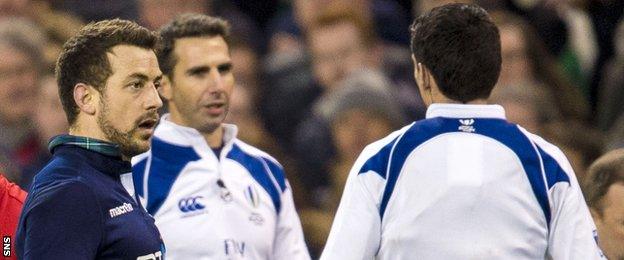
Scotland conceded a host of early penalties in Dublin on Saturday
Scottish resilience
It was an odd finale to the championship. Thrilling, but peculiar. When Scotland captain Greig Laidlaw put over his penalty at the end of the first half all rugby logic was cast to the winds of south Dublin.
Ireland had dominated to an outrageous degree. They were winning the breakdown, winning the aerial battle, winning the possession game and the territory game, they had conceded three penalties to Scotland's eight, had played a quarter of the action with a one-man advantage and had spent 82% of their time in Scotland's half.
This was a rout - only it wasn't. It was still an eight-point game.
Ireland should have been out of sight but they couldn't quite shake off their resilient visitors. In years gone by, in a contest of this kind, Scotland would have been in a box awaiting burial at the break.
The fact that they were not just alive but sprightly midway through the second half was a testament to their character and at their ability to execute when chances come their way.
Largely, they fed off scraps but they still managed to score 25 points. That's more points than they have scored against Ireland in the Six Nations in 15 years.
It's the most points they have scored in Dublin in 31 years. Does this come as consolation? Not hugely, but it's a measure of what Scotland's attack can do even off limited ball.
When Richie Gray cantered in under the posts in the 56th minute he brought the deficit back to eight from a high of 15. It was a reminder to the Irish that the kind of processions they have enjoyed against the Scots in recent times are not to be taken for granted any more.
Things have definitely changed under Cotter.
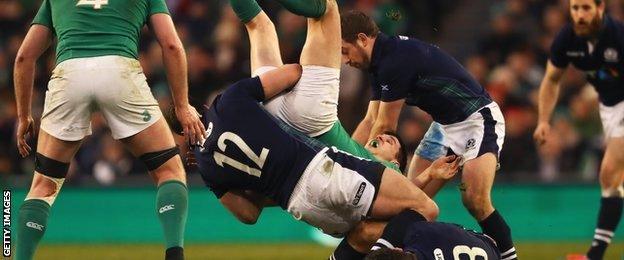
Alex Dunbar was sin-binned for flipping Johnny Sexton over a ruck
Discipline issues for Six Nations
The turning point was Alex Dunbar's yellow card, dished out by referee Pascal Gauzere for flipping Johnny Sexton on his side at a ruck. Gauzere was an unimpressive figure throughout the game and that was a call that had Laidlaw smiling disbelievingly as the card was shown.
Dunbar had no need to take Sexton out - the stand-off reacted somewhat theatrically in the aftermath - and he shouldn't have done it. Having shipped 12 points while Barclay was sin-binned in the first half, they conceded another seven while Dunbar was away.
Laidlaw didn't bite on the question later on, but it was only a few short weeks since he was himself dumped on his back at a ruck in Rome under the nose of a touch judge and yet there was no punishment for the perpetrator.
Where's the consistency? The Six Nations has been an utter shambles on the discipline front.
A minute after Dunbar exited, Devin Toner scored under the posts. That was the game right there.
In truth, a 10-point gap flattered Scotland even though they rallied in the second half and had 71% of the ball. There was a power deficit. Maybe the six-day turnaround from the France game had something to do with that. Maybe Jonny Gray's absence was a big part of the reason. Maybe.
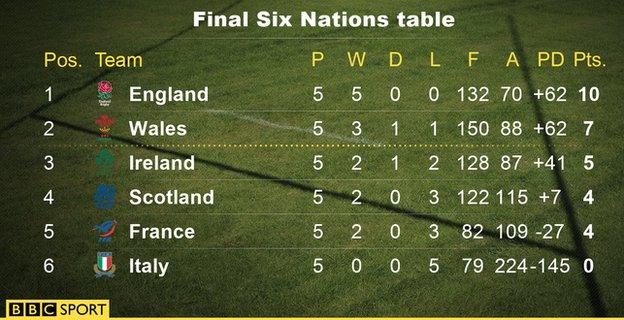
The sobering thing, though, is that Ireland were missing men, too. Stander was a colossus for them but when Joe Schmidt's team have all their back-rows fit again Stander might struggle to make the team. They have Peter O'Mahony to call on at six and Sean O'Brien to bring back at seven.
Scotland are making strides, but Ireland simply have more power athletes.
Most attractive team?
Cotter is reluctant to stress it - for fear that he comes across as content - but this was a heartening Six Nations by Scotland, the best in 10 years, not that there is much competition. Two wins, two defeats by a converted try or less and then Saturday when they gave themselves a chance, despite everything. It's a step-up.
This time last year there was no Nel, no Hardie, no Duncan Taylor on the scene. All three have been terrific. The attacking game is exhilarating at times.
It's a moot point, but Scotland have arguably been the most attractive team to watch in this Six Nations.
To move it up another level they need more back-row forwards of the quality of Stander and Heaslip - warriors who can play. Cotter will surely put his mind to broadening his options now. The search for new blood continues with a summer tour to Japan.
Scotland will go there in decent heart. So much has been done, but so much is left to do.
- Published19 March 2016
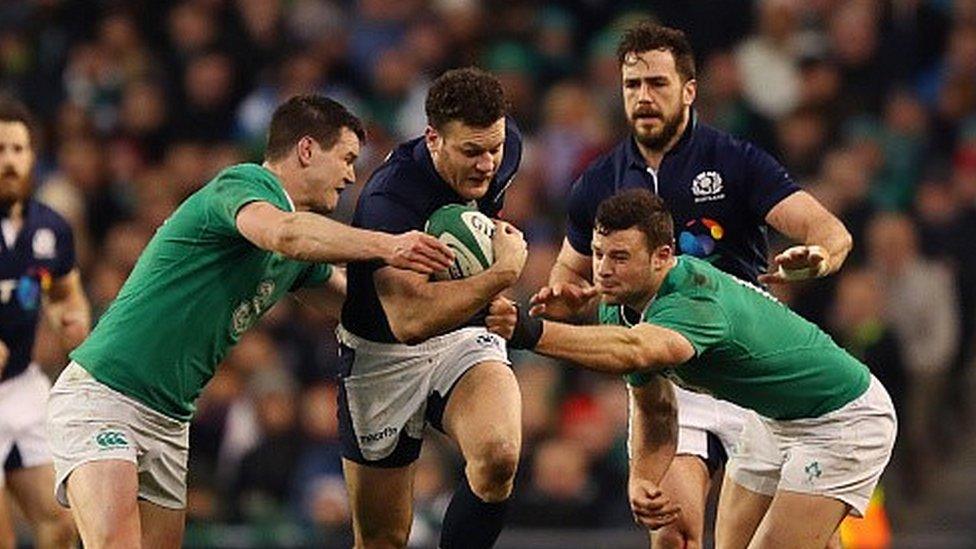
- Published19 March 2016
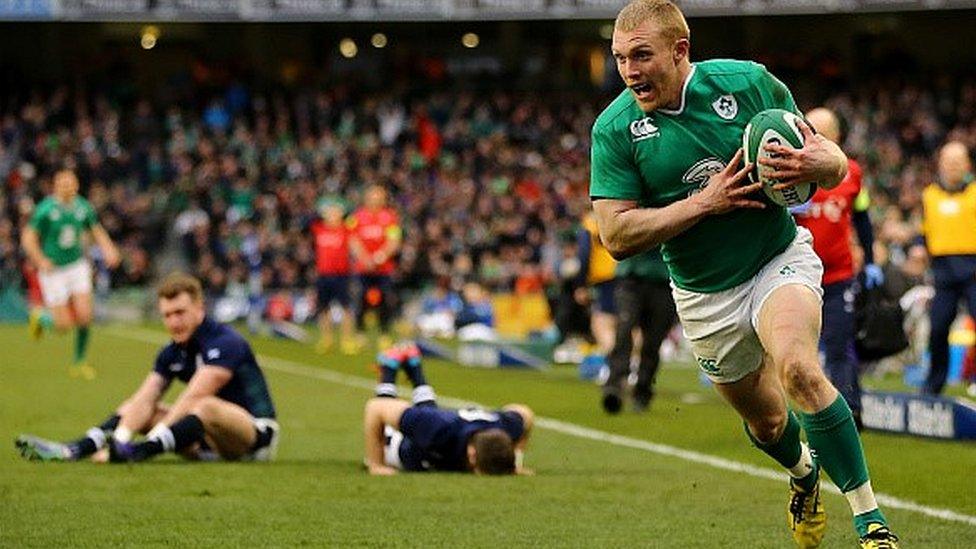
- Published18 March 2016

- Published14 September 2016
